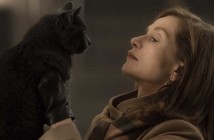
The (Melodramatic) Irony of Modernisation in Mountains May Depart (2015)
With simple lyrics of aspiration and utopian spaces, the Village People’s 1973 song ‘Go West’ conveys a youthful, optimistic energy. Filtered through the Pet Shop Boys’ pop dance/electronica lens in 1993, the song’s anthem nature increases ten-fold, particularly in the wake of the collapse of the Soviet Union and the Berlin Wall and, hence, the end of Communism. Emphasising the sociopolitical context in which it was covered, the Pet Shop Boys’ official music video for the song presents a computer animated world of a futuristic space replete with 1920s/1930s-era Soviet graphic design, groups of He-men marching, a black woman as the Statue of Liberty, and a rather literal depiction of the lyrics.
Jia Zhangke’s choice to open his film with the Pet Shop Boys’ ‘Go West’ cover, while a group of young men and women dance in unison, thus already conveys a particular mindset and gestures towards a particular narrative. The subsequent scenes are of a community celebrating Lunar New Year 1999. On the cusp of a new millennium, this group of people is hopeful and together, including the film’s focus of three friends in their mid-twenties: Tao (Zhao Tao), Jinsheng (Zhang Yi), and Jianjun (Liang Jingdong). The film charts their lives, directly and indirectly, in three separate periods: 1999, 2014, and 2025. As the film moves from one era to another, it reveals both the strength and weakness of its ambition. On the one hand, ‘Go West’ evolves into an ironic counterpoint to the development of the three friends’ lives and their community, which communicates Jia’s ability to register seismic socioeconomic changes at the level of the personal. On the other hand, the narrative devolves into a morass of melodramatic identity-searching that strikes falsely and makes one nostalgic for the previous eras, thematically and cinematically.

In 1999, Jinsheng shows off his newly bought car to Tao and Jianjun and all three head to a nearby river to set off fireworks. As a romantic triangle develops between the three friends, dissolving their friendship in the process, the shifting landscape of modernisation that is the backdrop of their lives cannot be ignored. In fact, this modernisation of the country is witness to and impacts the three friends and the evolution of their relationships: Jinsheng is clearly the entrepreneurial- and capitalist-savvy of the three and is therefore rather moneyed; Tao is of the fairly middle-class through her father’s electronics shop; and Jianjun is the least financially privileged, with his bicycle contrasting ever so clearly with Jinsheng’s car. Moreover, the romantic triangle articulates itself in economic terms: Jinsheng eventually buys the coal mine in which Jianjun works and, wrongly confusing personal and professional lives, fires Jianjun over their rivalry for Tao’s affections. This class-riven friendship turned rivalry then sets into motion a portrait of the dissolution of community and cultural bonds between generations in the face of modernisation.
By itself, the love triangle is a trite narrative detail. But the section’s power lies in the way Jia constructs the collision between the personal and economic and the emotional/psychological strains that can result from such collision – as well as the performances of his lead actors, particularly Zhao. As the price of coal rises again, so Jinsheng solidifies his capitalist stature, mirroring the country’s economic shift from communism to a socialist market economy. Meanwhile Jianjun finds himself inversely embedded in (or condemned to) a migrant worker’s stark lifestyle as a result of this very same shift. Tao, pressed to choose between the two men, selects Jinsheng as her beau. One may then mistake the film for an allegory, but there is actually no need to search for covert meaning because the characters are plainly and truthfully part and symptoms of modernisation, whether they like it or not. The question of agency becomes an issue, then, for as the world of the film transitions outwardly beyond China, the characters end up as the flotsam and jetsam of modernisation and history. They survive, each in his/her own way, but at what cost and for how long? Could they have actually done something more than just survive? The film does not necessarily answer these questions, but at this point it is enough that it asks them.
For the 2014 section, the aspect ratio widens from 1.33 to 1.85, in keeping with a vastly changed society whose ties to the outside world have tightened – to the detriment of the initial community. Once again, the socioeconomic finds its echo in the three characters: Tao is quite well off, though now divorced from Jinsheng, who won custody of their only child and is ever richer in Shanghai, while Jianjun is ill with black lung disease after years of working in coal mines around the country. In keeping with his filmography, Jia here stubbornly maintains this decades-spanning tale at an individual level. He does not give way to sweeping bird’s-eye views of change, preferring instead to obliquely capture change as it marks people’s lives. Also in keeping with his filmography, the emotional core lies with Zhao’s character Tao: she is the emotional link to all of the characters and community remembered and forgotten, be it her father, Jinsheng, Jianjun, her son Daole/Dollar (Dong Zijian), and by extension his Chinese-language teacher Mia (Sylvia Chang) in Australia in the year 2025.
Unfortunately, the film’s emotional power all but disappears in the 2025 section, notwithstanding the shift to 2.35 aspect ratio. Centered on Daole, now an English-speaking teenager, he has over the years become estranged from his parents emotionally and culturally, though memories remain. These memories resurface with the help of Mia, who becomes a friend (romantic and otherwise) and a surrogate mother figure. Mia has the potential to be a gripping character, being the only one who can navigate between English and Chinese. But clumsy English dialogue and mediocre performances merely highlight Tao’s absence and affective pull.
As if realising this absence, the film’s irony-tinged closing sequence makes the entire film worthwhile.



